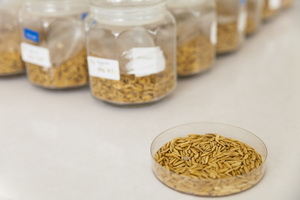
Study Shows CRISPR Mainly Used to Develop High-yielding, Healthier, and Stress-resistant Crops
November 29, 2017| |
 Scientists from France and the U.K. reviewed 52 articles on CRISPR use in crops published from 2014 to mid-2017 in peer-reviewed journals. The result is published in Emerging Topics in Life Sciences.
Scientists from France and the U.K. reviewed 52 articles on CRISPR use in crops published from 2014 to mid-2017 in peer-reviewed journals. The result is published in Emerging Topics in Life Sciences.
Results showed that 15 crops were studied for CRISPR application, and the most studied crop is rice, followed by tobacco, Arabidopsis, and corn. Most of the applications of CRISPR were to improve the yield performance of the crops, as well as to improve the nutrient content (biofortification) and the tolerance to abiotic and biotic stresses. For viral disease resistance, the reviewers observed two main strategies used: the integration of CRISPR-coding sequence in the host plant genome that targets and interferes with the virus genome once it is incorporated in the plant to establish a CRISPR-like immune system in the host genome; and the induction of a CRISPR-mediated targeted mutation in the host plant genome that will confer improved virus resistance traits.
In terms of the countries with most studies on CRISPR applications, China and the U.S. ranked first with 22 (42%) and second with 10 articles (19%), respectively. Europe, which includes the U.K., Sweden, France, Hungary, Germany, Austria, and Belgium, had 9 articles (17%) on CRISPR. The other countries which published articles on CRISPR include Saudi Arabia (5 articles), Turkey (5), South Korea (5), Philippines (5), India (5), Japan (4), and Israel (2). According to the authors, this data is consistent with the globalized economic, regulatory and research contexts and can be partly explained by the uncertain regulatory framework in Europe that may be holding back work towards commercial application.
Read the review article in Emerging Topics in Life Sciences.
| |
Biotech Updates is a weekly newsletter of ISAAA, a not-for-profit organization. It is distributed for free to over 22,000 subscribers worldwide to inform them about the key developments in biosciences, especially in biotechnology. Your support will help us in our mission to feed the world with knowledge. You can help by donating as little as $10.
-
See more articles:
-
News from Around the World
- AUC and FAO Ask African Gov'ts to Promote Agri-Biotech to Help Combat Food Insecurity
- Corn Research Exposes Mechanism Behind Gene Silencing
- Argentina Approves New Biotech Soybean
- EU Ban on GM Crops Hurting Productivity, says Retired Professor
- EFSA Releases Scientific Opinion on Four-Stack GM Maize
-
Research Highlights
- Biotech Cotton Co-expressing Vip3AcAa and Cry1Ac Confers Protection against Cry1Ac-resistant Bollworm
- Cgl2 Gene Involved in Cuticular Wax Synthesis in Cabbage
- SlJAZ2 Overexpression Accelerates Reproductive Growth in Tomato
-
Beyond Crop Biotech
- DARPA Explores on Using Plants to Detect Security Threats
- Researchers Pinpoint the Regulator of Phenylalanine Synthesis in Maritime Pine
- Scientists Study Genes Involved in Triterpenoid Synthesis in Birch
-
Announcements
- 3rd Biennial National Agricultural Sciences Conference and Exhibition
-
Resources
- Biotech Country Facts and Trends
-
Plant
- Heat Stress Increases the Efficiency of CRISPR-Cas9 Mutagenesis in Plants
- Study Shows CRISPR Mainly Used to Develop High-yielding, Healthier, and Stress-resistant Crops
-
Read the latest: - Biotech Updates (February 18, 2026)
- Gene Editing Supplement (January 28, 2026)
- Gene Drive Supplement (February 22, 2023)
-
Subscribe to BU: - Share
- Tweet
